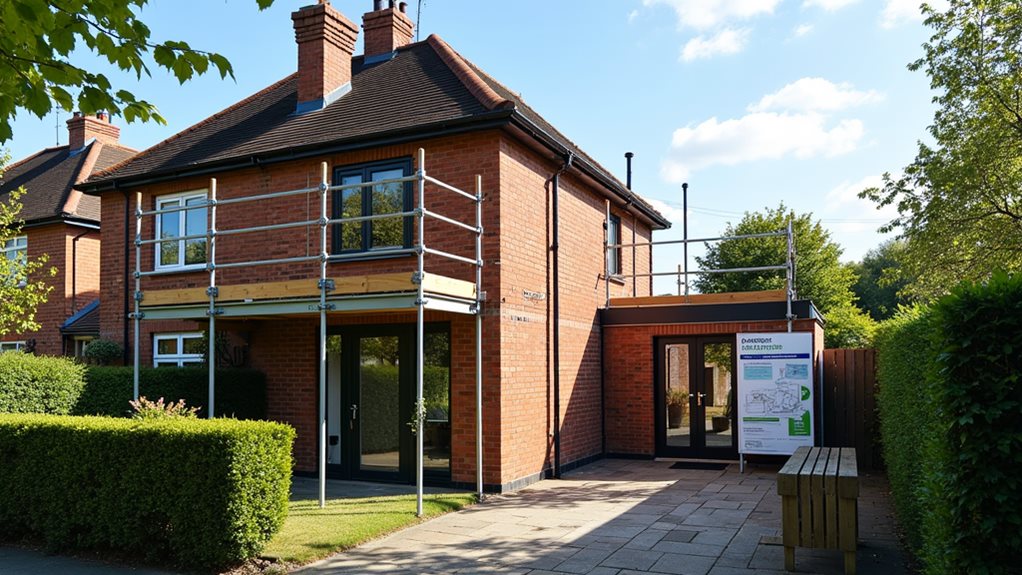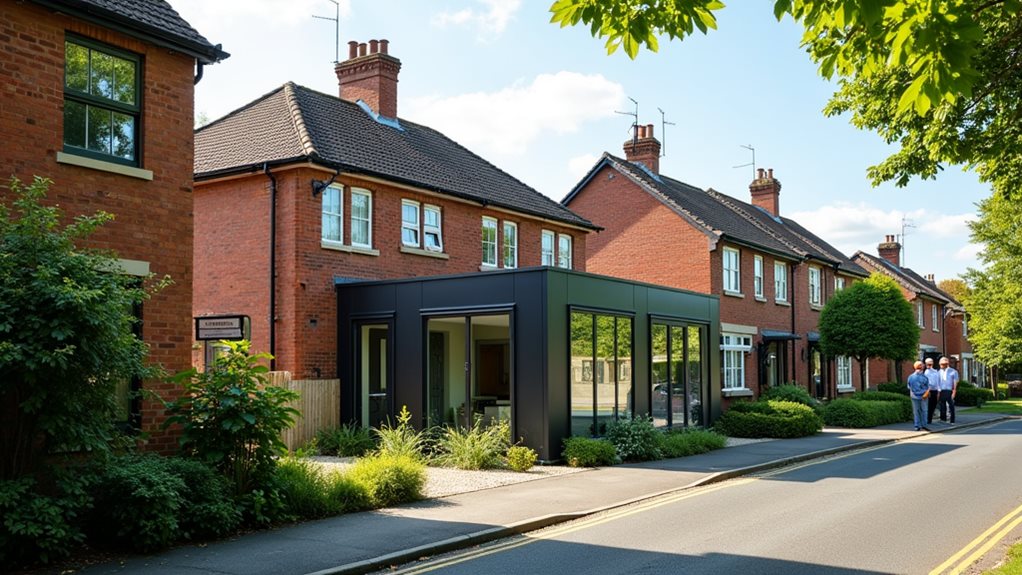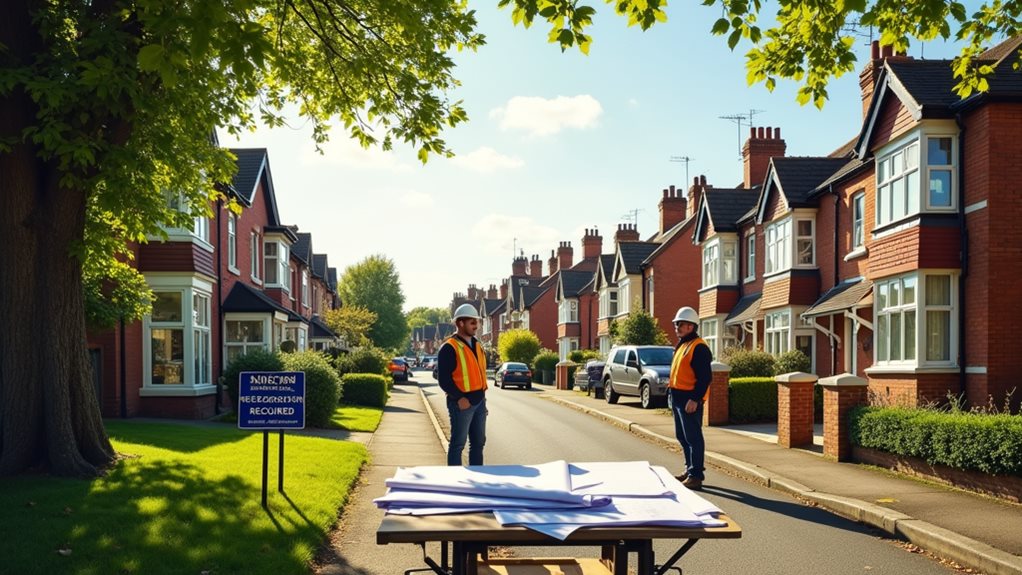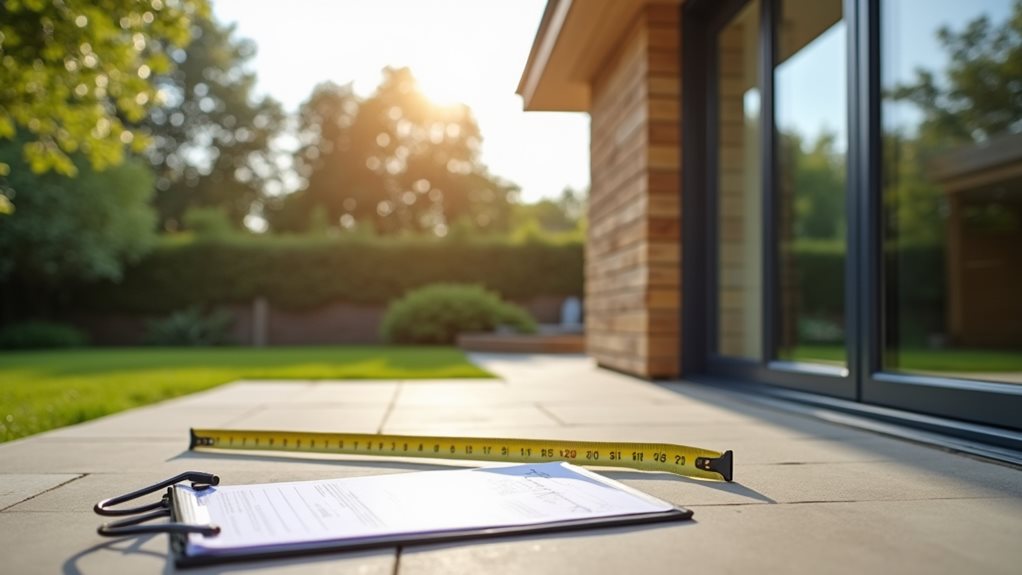Phone:
(701)814-6992
Physical address:
6296 Donnelly Plaza
Ratkeville, Bahamas.

Optimizing your home extension in Manchester requires understanding essential planning permissions, but which ones will you need to secure for your project?
In Manchester, you'll need to grasp the specific planning permissions required for your home extension. Generally, applications fall under full, outline, or householder categories. While minor extensions might qualify as permitted development, larger projects typically necessitate formal approval. You'll want to familiarize yourself with local regulations, especially height and area restrictions. It's essential to prepare detailed plans and gather necessary documentation like site plans and photographs. Don't forget to keep your neighbors informed to ease the process. So, as you think about your extension, understanding these key aspects will help you navigate the journey ahead smoothly.

When considering home extensions in Manchester, understanding planning permissions is essential. Steering through the complexity of planning permission can feel intimidating, but it's key to creating a space that truly feels like home.
You'll need permission if your extension adds to or greatly alters the existing structure of your house. Familiarizing yourself with application requirements can save you time and hassle in the long run.
There are several types of planning applications, including full, outline, and householder applications, each tailored to meet specific needs and guidelines. Before diving in, check for permitted development rules, as some minor extensions might fall under these exemptions. Additionally, consulting with local builders can provide invaluable insights into specific approval needs and expectations for your project.
Remember, certain areas may have more stringent regulations, especially in conservation zones or historic neighborhoods. Ensuring that your plans comply with building regulations is crucial to avoid complications during the application process.
Submitting your application is typically a smooth process through your local council's website. However, consider seeking pre-application advice to clarify any uncertainties. This step can provide peace of mind and a clearer vision for your project.
When considering home extensions, you've got several options to choose from, each catering to different needs and spaces.
Common types include single-storey extensions, like rear or side return, as well as double-storey additions that maximize vertical space. Extensions often increase property market value beyond construction costs. Understanding what's available can help you make informed decisions, especially when special area restrictions and exemption criteria factor into your plans.
Home extensions can greatly enhance your living space and add value to your property. When considering common extension types, you'll find several options to suit your needs and lifestyle.
Rear extensions extend your home into the garden, providing extra room for kitchens, dining, and living areas. Perfect for terraced and semi-detached houses, these typically have single-storey designs with flat or pitched roofs, bringing in more light.
Side return extensions utilize alleyways, making them ideal for period properties like Victorian homes. They often create spacious kitchen diners, transforming narrow areas into inviting spaces with possibilities for glazed roofs.
For a significant upgrade, wrap-around extensions combine rear and side extensions, forming an 'L' shape. This option maximizes your living area while maintaining a connection to the outdoor space.
Lastly, double-storey extensions expand both floors, offering substantial space while being more cost-effective per square meter.
Each extension type has unique design considerations to reflect your style and create a sense of belonging at home.
Carefully evaluate your vision, budget, and how these extension benefits can fulfill your family's needs in the long run.
Considering a home extension in Manchester? You'll want to explore the world of exempt extensions, which offer fantastic benefits.
These are extensions that generally don't require planning permissions, making them an attractive option for homeowners enthusiastic to expand. Single-storey extensions, for instance, allow you to extend your home up to 8 meters, provided you meet specific height restrictions—like 4 meters for detached houses.
Rear and side return extensions can also enhance your space while keeping the front of your home unchanged.
However, there are exempt extension limitations to keep in mind. While you can create more room, your extension can't infringe on your neighbors, so thoughtful planning is essential.
Double-storey extensions, though often requiring permission, can still fall under permitted development if they adhere to height restrictions.
Maneuvering the complexities of special area restrictions is essential for homeowners looking to expand their properties in Manchester. Understanding these limitations can't only save you time but also prevent costly errors in your home extension projects.
If your property is situated in a conservation area, you'll face added scrutiny and specific design restrictions that align with the historic aesthetic of your neighborhood. That means any proposed extensions must harmonize with existing architecture and street character.
Keep in mind that Article 4 Directions may further restrict what you can do without full planning permission, so consulting local authority guidelines is vital.
When considering rear or side extensions, be mindful of height and depth limitations, ensuring that your plans respect neighboring properties' light and privacy.
If you're leaning towards a loft conversion, remember the volume limits and structural integrity of your existing roof.
Consulting with neighbors before beginning an extension is a good practice, as their consent can help ease the planning process.

When planning a home extension in Manchester, understanding local regulations is essential to guarantee compliance and avoid costly mistakes.
First, you'll want to familiarize yourself with the general permitted development rules. Extensions can extend up to six meters for semi-detached homes and eight for detached ones, as long as they meet specific conditions. Remember, single-storey extensions can't exceed four meters in height and must be mindful of neighboring boundaries.
You also need to reflect on your garden space. Your extension can't occupy more than half of your outdoor area. Additionally, the building materials you use should closely match those of your existing home, ensuring a harmonious look that fits with the neighborhood.
If your property has been extended before or is located in a conservation area, you may have limited permitted development rights. It's always wise to chat with your neighbors about your plans, as their input can often lead to smoother sailing.
Finally, don't forget that planning permission and building regulations compliance are two separate matters you'll need to navigate carefully for your project to succeed. Taking these regulations to heart will help you create a beautiful extension that feels like home.
Steering the application process for your home extension in Manchester is vital to bringing your vision to life. Start by visiting your local council's website to determine the requirements; understanding whether you need planning permission or Prior Approval is significant. Each type has specific criteria, so it might help to consult with architects or planners for guidance.
Once you've pinpointed your needs, gather detailed plans of the proposed extension. Confirm these plans comply with building regulations and check for any restrictive covenants on your property deed. Addressing boundary disputes early on can save you headaches later.
Now, fill in the application forms and submit them to the Local Planning Authority (LPA), making sure you include all required information and supporting documents. Don't forget about the fee structure; you may need to pay application fees depending on your request.
After submission, be ready for the application timeline to unfold. The LPA will assess your application before making a decision. If approved, you can get started on your construction; just make sure you follow any conditions set forth.
Stay connected with your neighbors to address any concerns they might've throughout the process.

Gathering the right documentation is essential for a successful planning permission application for your home extension in Manchester. Start with your documentation checklist, which should include detailed plans and drawings.
You'll need site plans showing the location of your proposed extension, along with floor plans and elevations, both existing and proposed. Make sure to include any structural changes you plan to make.
Next, prepare supporting documents that explain the purpose of the extension, its environmental impact, and details about the materials you'll use. Don't forget photos of your existing property, as these will help illustrate your vision.
If your home is in a conservation area, consider the conservation and heritage assessments, ensuring compliance with local regulations.
Lastly, gather technical reports and certifications, including structural engineering reports and energy performance certificates. These documents fulfill essential submission requirements and help establish that your extension meets current building regulations.
Home extensions in Manchester can bring both excitement and unexpected hurdles. As you commence on this journey, be prepared for common challenges that can arise along the way.
First and foremost, legal disputes with neighbors can be a significant issue. Misunderstandings about property boundaries or encroachment can lead to costly legal battles, so it's essential to address right to light and privacy concerns upfront. Involving a conveyancing solicitor can help you navigate these disputes effectively.
On top of legal matters, planning permission issues often surface. Many extensions in Manchester require permits, and misinterpreting these regulations can result in rejections. Consulting with an architect familiar with local guidelines can save you headaches down the line.
Also, keep a close eye on your budget. Extensions can cost between £1,800 and £3,000 per square meter, and it's easy to face budget overruns if you're not careful. Proper financial planning, along with an understanding of design complexity, can guarantee you stay on track.

When planning your home extension in Manchester, understanding building regulations compliance is key to avoiding headaches down the road. You need to guarantee your extension meets the local building code and aligns with all safety standards, which are in place for your well-being.
Generally, your plans must comply with specific regulations unless you're opting for an exempt structure like a porch or conservatory that meets the size requirements.
It's important to submit detailed plans to your local council, as building regulation approval is separate from planning permission. Make sure you understand what's required because your extensions must meet minimum design and construction standards for health and safety.
Even if some small extensions mightn't demand regulation approval, it's wise to check. Remember, you're responsible for obtaining all necessary consents, so leaning on professionals can be a huge help.
Consult with architects or construction teams familiar with Manchester's requirements—they can guide you through the process and guarantee compliance. Being proactive now means less stress later, allowing you to focus on making your home extension truly yours.
Steering through the maze of special considerations is vital for anyone looking to extend their home in Manchester.
Pay attention to these key aspects to avoid unexpected hurdles:
It's important to comply with all regulations, especially those concerning health and safety.

Before diving into a home extension project in Manchester, it's crucial to understand the importance of consultation and guidance. You'll want to determine if planning permission is needed before moving forward with any significant alterations. Extensions that exceed certain dimensions generally require it, and special considerations apply to properties in conservation areas or with Article 4 directions.
Engaging professionals like experienced architects or building designers can make a world of difference in your project planning. They're adept at traversing Manchester's building regulations and can foresee potential hurdles, helping you incorporate solutions from the start.
Remember, effective communication between you and your chosen professionals guarantees your vision remains intact while adhering to local regulations.
Don't overlook the resources available through local council websites, which provide invaluable guidance on application processes and specific guidelines. Consulting legal experts can also assist with paperwork and compliance issues, allowing you to focus on bringing your home extension dreams to life.
Maneuvering the permissions for home extensions in Manchester can feel like trekking through a maze, but with the right information, you can find your way. By understanding planning permissions, adhering to local regulations, and preparing the necessary documentation, you'll be setting yourself up for success. So take the plunge—by staying informed and consulting relevant experts, you'll not only enhance your home but also enrich your life. Remember, a well-planned extension can turn your house into a dream home.